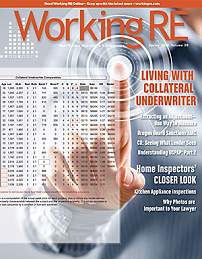 |
>> See Past News Editions >> Click to Print Protect your license and your livelihood with the Expert’s Guide by Tim Andersen, MAI. Click now 2015 AMC Guide Increase orders, turn down low-fee AMC work. Click now |
Editor’s Note: Besides being a bit of good news, this ruling could have implications for all appraisers working for AMCs.
Appraisers Landmark $36 million Settlement with Bank of AMerica for Failure to Pay Overtime
Settlement Covers 365 Plaintiffs Who Served as Residential Real Estate Appraisers
Oakland, CA – Today, employment and civil rights attorney Bryan Schwartz announced a settlement between Landsafe Appraisal Services, Inc., a subsidiary of Bank of America (NYSE: BAC) and 365 current and former employees working as residential real estate staff appraisers. The plaintiffs had sought damages for their misclassification as exempt from overtime, which left them working long hours, day in and day out, without additional compensation. Plaintiffs are seeking preliminary court approval in September 2015.
The lawsuit was first filed in April 2013 in federal court in Orange County. It alleged that Bank of America erroneously applied the “administrative” and “professional” exemptions to residential staff appraisers. Plaintiffs maintained that they typically worked from early in the morning until late at night, churning out reports that are a required part of every mortgage loan. The job required no special academic degree – just a state license. One of the named plaintiffs, Ethel Joann Parks of Manteca, California worked for Bank of America’s Landsafe until 2012. For years, she regularly toiled from 6 a.m. to 10 p.m. completing appraisal reports and, in the process, missing out on daily life and major family events. Rarely did she have time throughout the day to take a break to eat or rest because the artificially short deadlines set by Bank of America forced her to constantly keep working.
Ms. Parks decided to step forward because she felt that the bank failed to treat her, and other staff appraisers, “as human beings” with “family and personal needs that should be acknowledged.” She added, “I am vindicated by this lawsuit and the exceptional relief obtained on behalf of the class. I hope it will force banks and appraisal management companies throughout the country to reconsider pressuring their staff appraisers to work long hours without paying overtime.”
(story continues below)

(story continues)
“We have seen over and over again across the economy that employees are misclassified, depriving them of overtime compensation, when under state and federal law they are due the wages,” said Bryan Schwartz, founder of Bryan Schwartz Law, lead counsel for the 365 class members, along with the Los Angeles-based firm of Schonbrun Desimone Seplow Harris & Hoffman. “These individuals worked hard, generated thousands of reports a month for the employer to sell mortgages, and were not compensated for their efforts as the law requires. We hope this settlement helps change the playing field for these and many other employees nationwide,” Attorney Bryan Schwartz added.
Judge David O. Carter certified a nationwide class action in December 2013 under the federal Fair Labor Standards Act, and certified a class action in California in June 2014 under the California Labor Code (See Court Certifies Class and Approves Nationwide Class Settlement for Review Appraisers). In May 2015, the Court granted plaintiffs summary judgment as to the major defenses Bank of America was asserting, and rejected the bank’s effort to kick the suit out of court. This resulted in a ruling under which Bank of America would likely owe the workers considerable back wages for overtime and missed meal and rest periods (See Appraisers Entitled to Overtime, Court Holds). The bank asked the Court for permission to appeal the summary judgment decision immediately, denying any wrongdoing. The case was set to go to trial on August 31, but the $36 million settlement, if and when approved by the Court, resolves all claims.
(story continues below)
For Attorney Schwartz, this is just one of many recent out-of-court settlements in service of employees who were denied lawful compensation for their efforts. In 2014, Schwartz and his co-counsel settled another part of the same case against Bank of America (as to review appraisers) for $5.8 million. This makes nearly $42 million for workers in the suit as a whole. Schwartz has also achieved numerous other multi-million dollar settlements on behalf of thousands of misclassified workers nationwide.
“Employers take grave risks by cutting corners, and not fairly compensating their employees in tune with state and federal law. My firm and many others, including my co-counsel, are working to end wage theft in the economy…quickly,” added Schwartz.
The Plaintiffs are seeking the Court’s preliminary approval of the settlement in September, and hope to have the Court’s final sign-off so class members will receive their payments within the next several months.
The case is Terry P. Boyd et al. v. Bank of America Corp. et al., case number 8:13-cv-00561, in the U.S. District Court for the Central District of California.
Upcoming Webinar
How and Why of Your Appraisals: How to Create a Proper Reconciliation
Presented By: Tim Andersen, MAI
Date: September 10th, 10:00 – 11:30 a.m. PST
“Excellent webinar. I could not write notes fast enough!” – P. Murphy
Effective reconciliation is CRITICAL to communicating the assignment results to the appraisal reader. Learning how to reconcile the information in your appraisal is a proven way to make your clients happy, become a better appraiser, and avoid state sanctions. This webinar includes practical tips and advice from USPAP expert Tim Andersen, MAI, on navigating the crucial, final step of every appraisal- the Reconciliation. See what to include and what to leave out in order to effectively and convincingly tell the story of your appraisal. Avoid call backs and burnish your reputation as a professional with this valuable and important webinar. Sign Up Now!
Fall Webinar Schedule:
September: How to Create a Proper Reconciliation (above)
September: Complaints, Claims and Your Teflon Suit (free)
October: Professional Appraiser Series (2-parts)
November: Appraiser Adjustments – Solving Common Problems (2-parts)
Season Ticket: $129 (Save 35% on all six webinars)
Save $78: Get the Season Ticket
About the Author
Bryan Schwartz (BryanSchwartzLaw.com) is a leading California attorney representing workers in wage, discrimination, and whistleblower claims. In recent years, he has represented residential and commercial appraisers in multiple, nationwide class action lawsuits against their employers. For more information about this case, please contact Bryan Schwartz:Bryan@BryanSchwartzLaw.com.
>Click to Print
>New: Collateral Underwriter Blog: Find answers, offer solutions.
>Opt-In to Working RE Newsletters
Send your story submission/idea to the Editor: dbrauner@orep.org



by Cal@notice.com
A $200 FNMA 1004 with an MC addendum , orig. comp photos, two active listings, etc. is ILLEGAL. It is NOT a “customary and reasonable” fee for the work involved!
-After the paper & ink used for your work file, milage to Subject & comps, your internal review, your office help, your electric bill, depreciation to your computer & software, MLS fees, etc. ……your net profit is $8/hr. This is an unlawful practice and needs reported to your local and state attorney generals for prosecution. DODD- FRANK is law.
by Michael Ford, CA AG, SCREA, AGA, GAA, RAA
I’m fired up by this article!
OK, we all know hourly and salaried employees are subject to different rules than independent fee appraisers but this sure opens the door for OUR class action suit next!
I see two possible causes-perhaps attorneys can see more:
(1) Requirements to perform to pre set client specific guidelines in addition to USPAP; set appointments within a deadline and to return reports within a specified time all for a non negotiable fixed low fee MAY (remote) result in us being considered employees; but more probably-
(2) Dodd-Frank required “Customary and Reasonable fees”. Its increasingly clear in many jurisdictions across America that large AMCs are not even paying ‘customary fees’ let alone reasonable fees based on assignments complexity. In fact it can very well be established that price fixing of appraiser fees starts with those AMCs that are citing $495 to $550 flat rate national appraisal management fees to THEIR banking clients. MOST (80%+-) are at $495.00.
When an unreasonable cap is applied before the bid is ever put out to appraisers, the result cannot possibly be “customary or reasonable” by any rational metric! Same applies to payment promptness. Anyone still taking longer than two weeks to get paid on completed work-even though the AMC was paid up front? (Maybe FNMA should be added to any such a suit since THEY are the ones that officially forbid appraisers from being paid at the door anymore).
I already sent the lead attorney in this story an inquiry on behalf of the AGA/ OPEIU AFL-CIO minutes ago.
If ANYONE is interested in pursuing this either with this attorney, or seeking others for a possible national class action suit to obtain reasonable appraisal fees NOW is the time to contact and join AGA! Email: janbellas@appraisersguild.org or contact me direct at (714) 366 9404 or write to mike@mfford.com ; AGA National Appraiser Peer Review Committee Chairman, OPEIU/AFL-CIO.
It is LONG past time to stand up for ourselves!
-